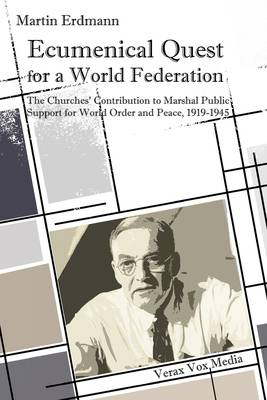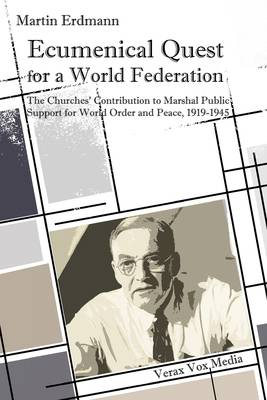
- Afhalen na 1 uur in een winkel met voorraad
- Gratis thuislevering in België vanaf € 30
- Ruim aanbod met 7 miljoen producten
- Afhalen na 1 uur in een winkel met voorraad
- Gratis thuislevering in België vanaf € 30
- Ruim aanbod met 7 miljoen producten
Zoeken
Ecumenical Quest for a World Federation
The Churches' Contribution to Marshal Public Support for World Order and Peace, 1919-1945
Martin Erdmann
Paperback | Engels
€ 56,95
+ 113 punten
Omschrijving
In his book, Ecumenical Quest for a World Federation, Dr. Erdmann deals primarily with John Foster Dulles' participation in the ecumenical movement from 1919 to 1945. Dulles' role in shaping the religious, economic and political policies of the Federal Council of Churches in its support of world order and peace, especially in his function as chairman of the Commission on a Just and Durable Peace, was crowned with success in the founding of the United Nations Organisation in 1945. His personal friends Philip Kerr (Lord Lothian) and Lionel Curtis, the principal leaders of the Round Table Group, come into the picture at various times. By and large they pursued the same objectives as those of Dulles.The book shows the detailed influence of the Round Table Group and its affiliated organisations - such as the Royal Institute of International Affair (London) and the Council for Foreign Relations (New York City) - on the ecumenical movement, using it successfully for their purpose of creating an international community of nations.
Specificaties
Betrokkenen
- Auteur(s):
- Uitgeverij:
Inhoud
- Aantal bladzijden:
- 492
- Taal:
- Engels
Eigenschappen
- Productcode (EAN):
- 9780692617939
- Verschijningsdatum:
- 15/01/2016
- Uitvoering:
- Paperback
- Formaat:
- Trade paperback (VS)
- Afmetingen:
- 152 mm x 229 mm
- Gewicht:
- 653 g

Alleen bij Standaard Boekhandel
+ 113 punten op je klantenkaart van Standaard Boekhandel
Beoordelingen
We publiceren alleen reviews die voldoen aan de voorwaarden voor reviews. Bekijk onze voorwaarden voor reviews.











